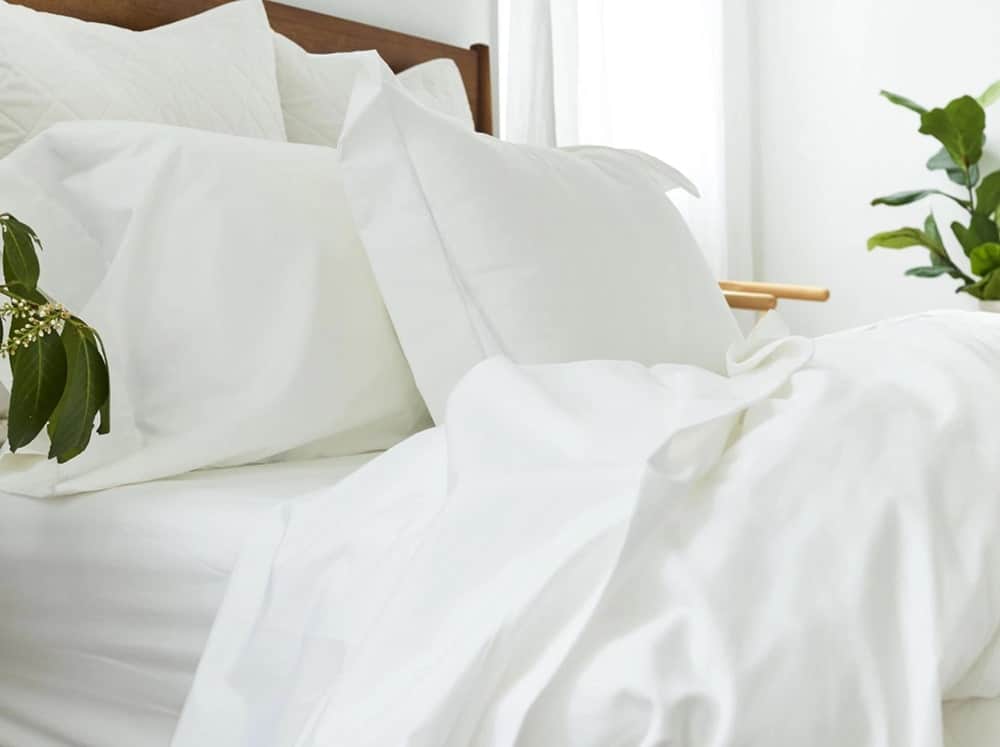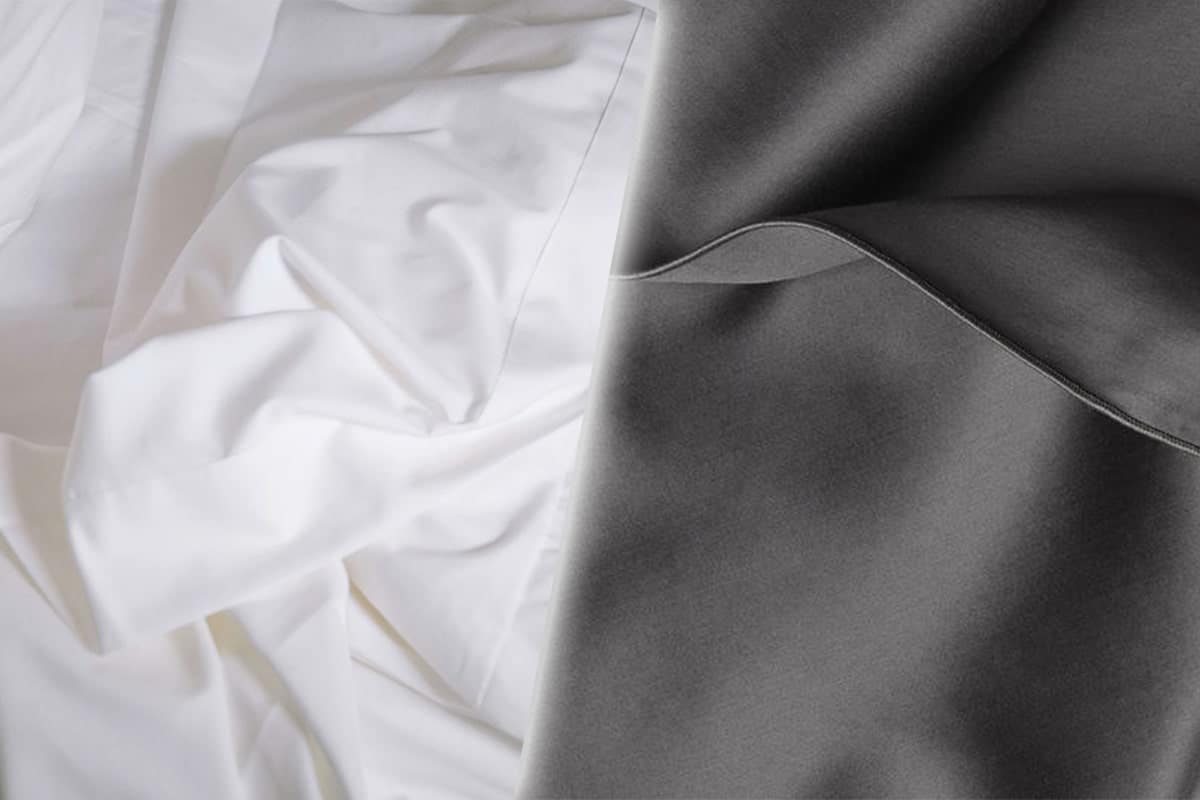Both polyester and cotton sheets feature a certain set of properties that are individual to them. When it comes to choosing between polyester and cotton sheets, making a valid comparison of their performance based on certain parameters becomes extremely important.
We hear about 100% cotton products all the time; their unparalleled durability and superior comfort is the talk of the town. However, does polyester manage to compete with cotton for the same set of attributes? Let’s take a look!
Difference Between Polyester and Cotton Sheets
Both polyester and cotton sheets have a certain set of characteristics that sound alluring to some while deterring others. Which of the two sheets will work best for you depends on your personal preferences, as well as the ability of the particular sheets to deliver on what they promise.
While cotton sheets promise all benefits brought about by a 100% organic bedding material, polyester sheets tend to lead the way with their competitive pricing. Comparing the two materials based on a few fundamental characteristics can assist narrow down your options to help you choose the one which fits your needs well.
1. Fabric and Feel
Cotton has for long been the best bed sheet material for a reason. Its organic nature has made it a preferred choice among most people living a green lifestyle. Cotton sheets are made using threads of cotton harvested from the cotton plant, which are later woven together intricately to produce a strong and durable fabric.
Cotton, especially the high end ones such as the Egyptian cotton, has a rather soft and crisp feeling attached to it. This is made possible with the use of longer cotton fibers in the manufacture of cotton sheets, which increases the resulting sheet’s smoothness. Cotton as a fabric is extremely comfortable. Moreover, with its hypoallergenic nature, it is ideally suited to those that have a tendency to develop allergies.
Cotton is also a preferred material for bed sheets used in luxury hotels. If you are looking for some super soft sheets, Egyptian cotton or pima cotton sheets are your best bet.

Polyester on the other hand is entirely synthetic, constructed using a series of binding agents and machinery. Even though it has no organic properties, polyester can and does compete with cotton in terms of its fabric quality.
Polyester sheets are soft and smooth, just like any other cotton sheet. They are actually rather lightweight as well. Polyester sheets are less likely to fade or shrink following a wash, however they are known to bunch up as the person sleeps on their side, thus negatively affecting the quality of your sleep.
2. Durability
Both polyester and pure cotton sheets tend to be highly durable. Cotton fabrics generally feature strong weave patterns like satin, sateen and percale made using long-staple and extra-long staple cotton fibers, which in turn makes them fairly durable.
It however is worth noting that cotton fibers are known to shrink in the laundry. There is, therefore, a fair chance that the lifespan of your cotton bedsheets will shorten with increased number of trips to the laundry.
Unlike most synthetic fibers, cotton sheets tend to get softer with each wash. While that would normally add to the comfort of cotton sheets, however, the softer these sheets are, the more likely they are to break down over time.
Polyester, on the other hand, is a synthetic material that competes with the durability of cotton sheets and in most cases, outlives them. This is primarily because polyester is made using certain plastic derivatives which aren’t exactly easy to tear or rip apart.
Moreover, polyester fibers are less likely to shrink as compared to their cotton counterparts and are fairly resistant to pilling. Your polyester sheets are therefore slightly more durable than cotton ones.
3. Breathability and Moisture Wicking
For a fabric to be breathable, it must allow an unrestricted flow of air through it. Cotton, being an organic material, is naturally breathable and showcases superior temperature regulating properties.
Cotton is less likely to trap excess body heat to make you sleep hot. It allows your body heat to be dissipated into the atmosphere of your room instead, thereby helping you sleep cool.
Moreover, cotton has remarkable moisture wicking properties. Your night sweats are absorbed by cotton sheets and allowed to evaporate into thin air, to introduce a slightly cooling effect, enabling hot sleepers to sleep cool throughout the night.

Polyester, on the other hand, is a synthetic material which is not at all recommended for people who sleep hot or those who live in the warmer climates. These sheets are relatively less breathable than the cotton ones and are more likely to trap your body heat hence raising your body’s temperature.
Even though polyester features a lesser level of moisture absorption, it however does have the ability to dry quite fast. In case you sleep hot and are annoyed with the night sweats, polyester can therefore utilize its fast-drying properties to deliver a slight cooling effect while ensuring you sleep dry for the most part of the night.
On the other hand, polyester’s shortcoming as a less breathable material has not gone unnoticed and manufacturers have come up with better polyester varieties. Some of these do have remarkable breathability and moisture wicking properties, simply through the use of better weaving patterns.
4. Cleaning and Maintenance
Since cotton sheets are hypoallergenic in nature, they generally require very little maintenance through the years. If however you are obsessed with cleanliness, it is worth noting that your cotton sheets will start ripping after continuous and repeated washes.
Washing these sheets comes with a list of instructions that are meant to be carefully followed. First off, these sheets can be washed in the washing machines but only at a normal or delicate cycle. The temperature of the water used in washing depends on the color of your cotton sheets. Darker colors should be washed with colder water to prevent fading of color, while warmer water works better to remove stains from the white or light-colored sheets.
Cotton sheets are prone to wrinkling following a wash. In order to prevent this from happening, either tumble dry the sheets on a low heat setting or put them out in the sun to dry.
Similar to cotton, polyester is a rather low maintenance fabric, which can be easily washed in a washing machine, provided the care label instructions are adequately followed.
Polyester however isn’t as likely to wrinkle as cotton is. It instead is more prone to pilling and therefore needs to be dried preferably on a clothesline, out in the sun. Machine dryer should be used only if a clothesline is not available and should be set to the lowest heat setting possible.
5. Pricing
Polyester sheets are known to be less expensive when compared with cotton sheets. This is because polyester is made using synthetic materials which are generally easier to source.
Cotton sheets are highly expensive, especially the Egyptian cotton, pima cotton and supima cotton sheets. However, a fair comparison should take into account the various varieties of cotton as well as polyester sheets that are available in the market. While the Egyptian cotton sheets start at over $200, you might be able to find a decent cotton sheet set at $40.
The same goes for polyester sheets. Though the polyester varieties rarely ever cost as much as a good Egyptian cotton bedding, some varieties featuring better weaves and enhanced breathability do tend to be slightly more expensive than the traditional polyester sheets.

Frequently Asked Questions
Are polyester bed sheets bad?
Similar to all other bed sheet materials, polyester also comes with its fair share of pros and cons. It is therefore not outrightly a bad bed sheet fabric. For the most part, polyester is a highly affordable fabric that can outlive cotton, and has a soft and silky smooth touch to the skin that allows for a comfortable sleeping experience. On the other hand however, the material is not very breathable, so if you sleep hot, this might not be the right material for you.
Moreover, polyester sheets are prone to static, which can certainly damage your hair. With frequent washing and usage, the polyester surface loses its characteristic smoothness and can cause problems for those with a sensitive skin. It is all these considerations and more that eventually define whether a certain material is fit for your purpose or not.
Are polyester sheets hot?
That is precisely one of the greatest drawbacks of using polyester bed sheets. They are not very breathable, which is why the polyester sheets end up trapping your body heat and moisture to increase your body’s temperature. This will undoubtedly result in a sweaty and clammy sleep experience. However, polyester does offer some moisture wicking properties, and is known to dry real fast. So even if you sweat at night, the chances of your bed sheet drying your sweat to deliver a slight cooling effect, are not entirely lost.
Are cotton polyester blend sheets good?
Nothing really beats the smoothness and softness of 100 percent cotton sheets. If, however, you are looking to combine cotton’s unique soft-to-the-touch feel with the strength of polyester, the cotton-polyester blend might as well be the ideal way to do it.
A cotton-polyester blend is not only pretty comfortable, but also is relatively inexpensive, thanks to the readily available polyester varieties. Moreover, this blend tends to cash on the higher breathability of cotton and tear-resistance of polyester, to provide a product that has remarkable moisture wicking properties as well as superior durability.
The cotton-polyester blend sheets also tend to be less prone to shrinking, static, wrinkles and pilling; all of which are the problems associated with either cotton or polyester fabric. However, poly-cotton blends do not thrive well in high temperatures. Moreover, while it combines good qualities of both polyester and cotton, it generally also takes up some of the disadvantages of each.
Is polyester cancerous?
It most definitely is. This is because polyester is made using chemicals such as thermoplastics that tend to release plastic molecules everytime they are heated. So when you lie upon a polyester bedsheet, the heat from your body would cause these molecules to release and be absorbed by your skin. You are, therefore, sleeping on chemicals such as these that are known to cause cancer in human beings.
Among the many problems that polyester can cause, skin and lung cancer are the most common ones. This is because polyester carries carcinogens which are cancer causing chemicals.
Does polyester contain BPA?
Even though BPA is generally used in the synthesis of most plastic products, polyester manufacturing does not make use of this harmful chemical. It has been associated with causing reproductive disorders by mimicking sex hormones. Many cardiovascular diseases and diabetes have also been associated with a prolonged exposure to BPA and other related products.
Are polyester sheets comfortable?
For the most part, polyester sheets are quite comfortable except for a few drawbacks. They generally feature a soft and smooth touch, the likes of which are expected of their silk counterparts. Moreover, these sheets are quite lightweight, which makes them easier to drape. They are made wrinkle resistant so you don’t have to sleep uncomfortably on a sheet that is prone to pills and wrinkles.
On the other hand however, if you suffer from night sweats, or live in a warmer climate, polyester sheets will not prove to be comfortable. Their feeble moisture wicking properties and poor breathability makes them extremely difficult to use at night. Moreover, the polyester sheets are also prone to static, so your hair might get damaged as well.
